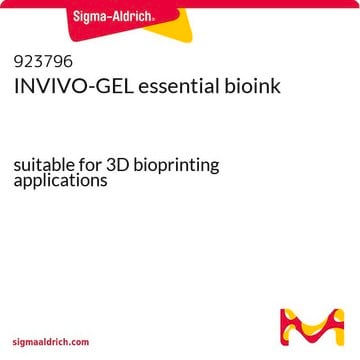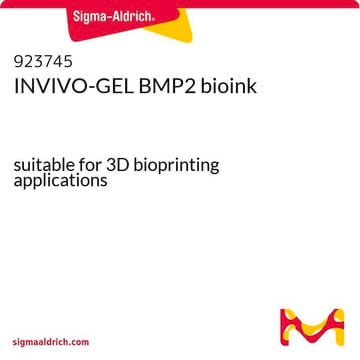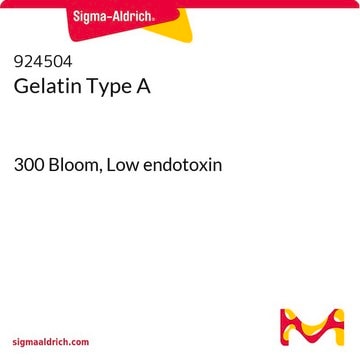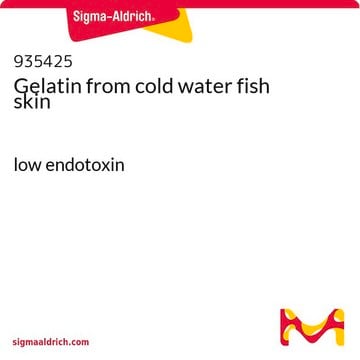915211
Lifeink® 240
acidic type I collagen bioink, 35 mg/mL
Sinónimos:
3D Bioprinting, Bioink, Collagen
Iniciar sesiónpara Ver la Fijación de precios por contrato y de la organización
About This Item
UNSPSC Code:
12352201
NACRES:
NA.23
Productos recomendados
Quality Level
sterility
sterile; sterile-filtered
form
viscous liquid
concentration
30-40 mg/mL (Collagen concentration)
35 mg/mL
impurities
≤10 EU/mL Endotoxin
color
colorless
pH
3.0-5.0
storage temp.
2-8°C
Application
Lifeink® 240 is a collagen based bioink that is suitable for 3D bioprinting using the FRESH printing technique. The recommended printing temperature is at 2-25 °C. It is a an acidic Type I collagen bioink at a concentration of 35 mg/ml. Lifeink® 240 is formulated in an acidic saline buffer solution. Once the collagen is printed into LifeSupport™, the pH and salts concentration of the printed structure become physiological. Cells can then be seeded onto the printed structure allowing for cell adherence and cellular remodeling of the 3D bioprinted structure. This bioink possesses high print fidelity, shear-thinning, strong mechanical strength, and good cytocompatibility.
Legal Information
LifeSupport is a trademark of Advanced BioMatrix, Inc.
Lifeink is a registered trademark of Advanced BioMatrix, Inc.
signalword
Warning
hcodes
pcodes
Hazard Classifications
Met. Corr. 1
Storage Class
8A - Combustible corrosive hazardous materials
wgk_germany
WGK 1
Elija entre una de las versiones más recientes:
Certificados de análisis (COA)
Lot/Batch Number
¿No ve la versión correcta?
Si necesita una versión concreta, puede buscar un certificado específico por el número de lote.
¿Ya tiene este producto?
Encuentre la documentación para los productos que ha comprado recientemente en la Biblioteca de documentos.
In vivo remodeling of a 3D-Bioprinted tissue engineered heart valve scaffold.
Maxson E L, et al.
Bioprinting, 16, e00059-e00059 (2019)
G Filardo et al.
Bone & joint research, 8(2), 101-106 (2019-03-28)
Meniscal injuries are often associated with an active lifestyle. The damage of meniscal tissue puts young patients at higher risk of undergoing meniscal surgery and, therefore, at higher risk of osteoarthritis. In this study, we undertook proof-of-concept research to develop
S Fox et al.
Biomedical materials (Bristol, England), 14(4), 041001-041001 (2019-02-23)
Human autologous bioengineered skin has been successfully developed and used to treat skin injuries in a growing number of cases. In current clinical studies, the biomaterial used is fabricated via plastic compression of collagen hydrogel to increase the density and
A Lee et al.
Science (New York, N.Y.), 365(6452), 482-487 (2019-08-03)
Collagen is the primary component of the extracellular matrix in the human body. It has proved challenging to fabricate collagen scaffolds capable of replicating the structure and function of tissues and organs. We present a method to 3D-bioprint collagen using
Nuestro equipo de científicos tiene experiencia en todas las áreas de investigación: Ciencias de la vida, Ciencia de los materiales, Síntesis química, Cromatografía, Analítica y muchas otras.
Póngase en contacto con el Servicio técnico









